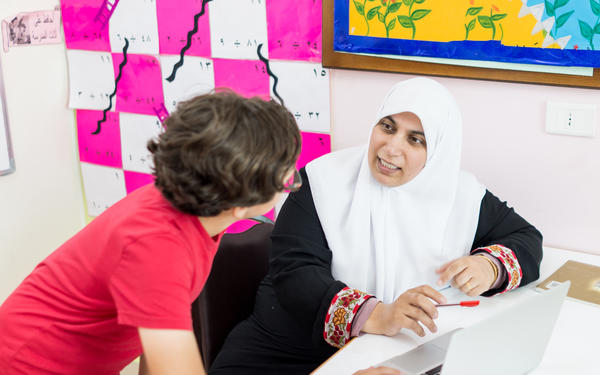Bridge to Success: raising standards of English In the United Arab Emirates (UAE)
In 2015, Cambridge opened conversations with the Ministry of Education (MoE) in the UAE about English-language development. The effective acquisition of English was central to the UAE’s long-term educational vision. The goal was that all students entering university should have a high degree of competence in English.

The challenge
Cambridge and the MoE discussed how to transform the new ambition into a realistic and properly resourced programme, with delivery of early elements in 2015. It was critical that the UAE had the right textbooks in its classrooms, running from Grade 1 (5–6 years old) all the way through to Grade 12. Cambridge already had an existing and respected English-language course – Cambridge Global English (CGE) – and the decision was made to adapt this for the UAE, renaming it Bridge to Success (BTS). The adaptation process was at the core of Cambridge’s support for the UAE’s education reform from 2015 to 2018 and beyond.
The repurposing of CGE was not just a matter of convenience. The series offered a single solution for language acquisition and embodied the ‘soft skills’ that have become so essential to the modern knowledge economy, such as problemsolving and critical thinking.
On the level of both language acquisition and pedagogical approach, CGE was an ideal series for the UAE. Yet it was evident from the outset that the series would have to be refined through a significant adaptation process to ensure that it was the best fit culturally and educationally for the UAE. Facilitating the adaptation process, and providing support training around this process, was Cambridge’s overarching priority.
Our approach
Project objectives for the MoE:
- Improve students’ English proficiency
- Enable students to achieve outstanding results in all English-teaching schools
- Prepare students for tertiary education and employment
- Prepare students for a knowledge based economy
- Encourage 21st‑century skills among students
The BTS publishing programme, which was ambitious in scope and schedule, was the core means of achieving the MoE’s objectives. Creating the series was not a simple matter of localising CGE. The CGE series was not a precise fit for the UAE education system in terms of its grade levels nor the division of the individual grades into lessons. The methodology behind creating the new books varied from heavy adaptation through to entirely new materials, written from scratch.
The BTS project was formed around three distinct but closely related strands of support and consultancy: publishing, assessment and training.
The heart of the publishing programme for the UAE was the adaptation of the CGE series to BTS. Cambridge continued to refine its understanding of the UAE context and micro adjust the adaptation process to ensure a fully fit-for-purpose suite of teaching and learning resources.
- The look and feel of CGE was retained for the BTS series.
- The content and structural revisions meant that there was much work to do from author, editorial and design perspectives. This was handled by highly experienced Cambridge authors and editors, working in teams with strong management. Central to aiding their work was that Cambridge and the MoE had a clear sense of macro process management.
- The CGE textbooks were adapted to suit the cultural perspectives of the UAE. It was not only imperative that Cambridge drew on its own extensive experience of producing culturally appropriate content for the Middle Eastern states, but also that it gained direct cultural feedback from the MoE early in the textbook development process.
Cambridge had a key role in developing the assessment tools accompanying the series.
- For each grade, Cambridge produced one live test that covered all of the key skills areas in the curriculum, working in partnership with the MoE to develop skills in writing assessments.
- Also included was the production of an item bank to allow the MoE to construct its own assessments going forward.
- All the assessments developed followed a standardised assessment framework and were aligned to the CEFR requirements.
Cambridge provided teacher training in each phase of the project. The model was revisited and adjusted after each phase to ensure BTS would perform at its full potential in the UAE
The results
Cambridge recognises BTS as a landmark project in its recent history of education reform. In 2017, Rodrick Smith, Global Managing Director of Education, perfectly captured the cooperation between Cambridge and the MoE:
Our collaboration with the Ministry of Education over the Bridge to Success programme is a partnership of which we feel very proud. Our teams have worked together to develop materials and training to support delivery of the new curriculum in an engaging, and relevant way. The Ministry of Education’s determination to develop the language skills of teachers and learners across the UAE using this new approach has been inspirational. Alongside the Ministry of Education, we recognise the central importance of English in any educational strategy, not only as a core 21st - century competency, but also to underpin learning and skills across the curriculum, particularly in STEM subjects.
In addition to the delivered outcomes of the project – the textbooks – the UAE project has also been a formative experience for both Cambridge and the MoE in handling complex language adaptation projects. The positive reception of the textbooks is testimony to the effort and innovation of both teams.
Cambridge Partnership for Education and the MoE are currently finalising an agreement to distribute the UAE Bridge to Success series to learners in disadvantaged countries in support of the UAE Learning for All Initiative.
